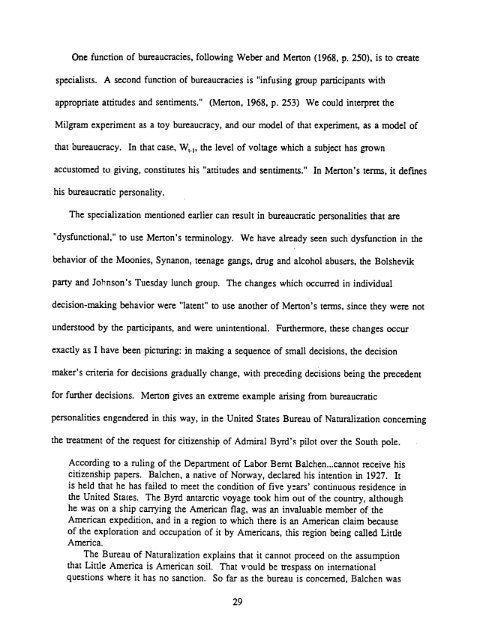INSTITUTE FOR
INSTITUTE FOR
INSTITUTE FOR
Create successful ePaper yourself
Turn your PDF publications into a flip-book with our unique Google optimized e-Paper software.
One function of bureaucracies, following Weber and Merton (1968, p. 250), is to create<br />
specialists. A second function of bureaucracies is "infusing group participants with<br />
appropriate attitudes and sentiments." (Merton, 1968, p. 253) We could interpret the<br />
Milgram experiment as a toy bureaucracy, and our model of that experiment, as a model of<br />
that bureaucracy. In that case, W,.,, the level of voltage which a subject has grown<br />
accustomed to giving, constitutes his "attitudes and sentiments." In Merton's terms, it defines<br />
his bureaucratic personality.<br />
The specialization mentioned earlier can result in bureaucratic personalities that are<br />
"dysfunctional," to use Merton's terminology. We have already seen such dysfunction in the<br />
behavior of the Moonies, Synanon, teenage gangs, drug and alcohol abusers, the Bolshevik<br />
party and Johnson's Tuesday lunch group. The changes which occurred in individual<br />
decision-making behavior were "latent" to use another of Merton's terms, since they were not<br />
understood by the participants, and were unintentional. Furthermore, these changes occur<br />
exactly as I have been picturing: in making a sequence of small decisions, the decision<br />
maker's criteria for decisions gradually change, with preceding decisions being the precedent<br />
for further decisions. Merton gives an extreme example arising from bureaucratic<br />
personalities engendered in this way, in the United States Bureau of Naturalization concerning<br />
the treatment of the request for citizenship of Admiral Byrd's pilot over the South pole.<br />
According to a ruling of the Department of Labor Bernt Balchen...cannot receive his<br />
citizenship papers. Balchen, a native of Norway, declared his intention in 1927. It<br />
is held that he has failed to meet the condition of five years' continuous residence in<br />
the United States. The Byrd antarctic voyage took him out of the country, although<br />
he was on a ship carrying the American flag, was an invaluable member of the<br />
American expedition, and in a region to which there is an American claim because<br />
of the exploration and occupation of it by Americans, this region being called Little<br />
America.<br />
The Bureau of Naturalization explains that it cannot proceed on the assumption<br />
that Little America is American soil. That would be trespass on international<br />
questions where it has no sanction. So far as the bureau is concerned, Bachen was<br />
29

















